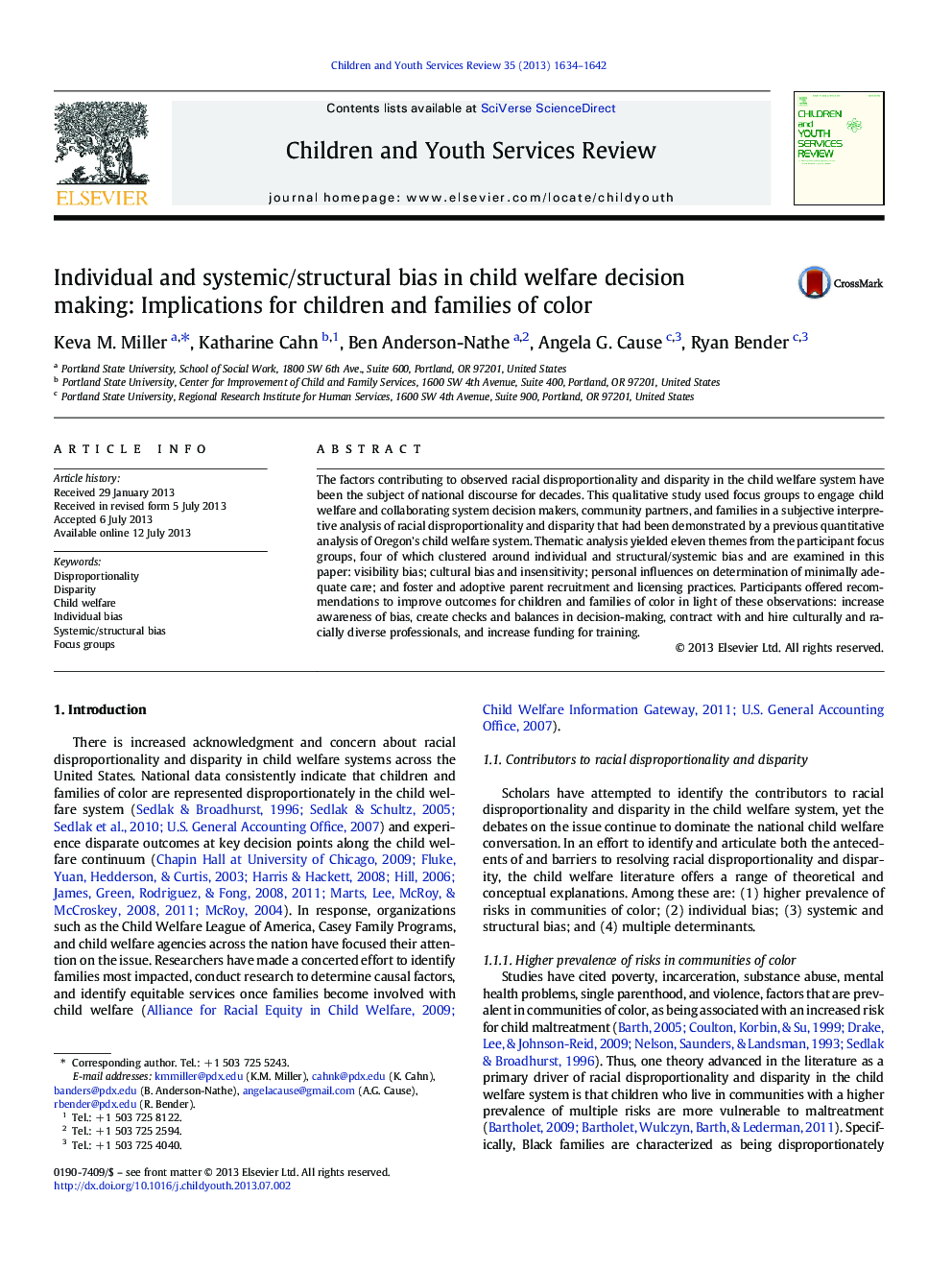| کد مقاله | کد نشریه | سال انتشار | مقاله انگلیسی | نسخه تمام متن |
|---|---|---|---|---|
| 10311637 | 617805 | 2013 | 9 صفحه PDF | دانلود رایگان |
عنوان انگلیسی مقاله ISI
Individual and systemic/structural bias in child welfare decision making: Implications for children and families of color
ترجمه فارسی عنوان
تعصب فردی و سیستمیک / ساختاری در تصمیم گیری در مورد رفاه کودکان: پیامدها برای کودکان و خانواده های رنگ
دانلود مقاله + سفارش ترجمه
دانلود مقاله ISI انگلیسی
رایگان برای ایرانیان
کلمات کلیدی
بی پروایی بودن، تناقض، رفاه کودکان، تعصب فردی، تعصب سیستماتیک / ساختاری، گروه های تمرکز
ترجمه چکیده
عوامل موثر بر عدم رضایت نژادی و عدم انطباق در نظام رفاه کودکان، طی دهه ها موضوع بحث ملی بوده است. این مطالعه کیفی از گروه های متمرکز برای شرکت در رفاه کودکان و همکاری تصمیم گیرندگان سیستم، همکاران جامعه و خانواده ها در یک تجزیه و تحلیل تفسیر ذهنی از عدم تناسب و اختلاف نژادی استفاده کرد که توسط تجزیه و تحلیل کمی از سیستم رفاه کودکان اورگان نشان داده شده است. تجزیه و تحلیل موضوعی، یازده موضوع را از گروه های تمرکز شرکت کننده، که چهار مورد آن را در کنار تعصب فردی و ساختاری / سیستمیک قرار داده اند، در این مقاله مورد بررسی قرار می دهد: تعصب دید؛ تعصب فرهنگی و بی حساسیت؛ تأثیرات شخصی در تعیین مراقبت حداقل مراقبت؛ و راهکارهای استخدام و واگذاری والدین فرزندان و فرزندان مجرد. شرکت کنندگان توصیه هایی را برای بهبود نتایج کودکان و خانواده های رنگی در این زمینه ارائه دادند: افزایش آگاهی از تعصب، ایجاد چک و تعادل در تصمیم گیری، قراردادن و استخدام حرفه ای های فرهنگی و نژادی متنوع و افزایش بودجه برای آموزش.
موضوعات مرتبط
علوم پزشکی و سلامت
پزشکی و دندانپزشکی
پریناتولوژی (پزشکی مادر و جنین)، طب اطفال و بهداشت کودک
چکیده انگلیسی
The factors contributing to observed racial disproportionality and disparity in the child welfare system have been the subject of national discourse for decades. This qualitative study used focus groups to engage child welfare and collaborating system decision makers, community partners, and families in a subjective interpretive analysis of racial disproportionality and disparity that had been demonstrated by a previous quantitative analysis of Oregon's child welfare system. Thematic analysis yielded eleven themes from the participant focus groups, four of which clustered around individual and structural/systemic bias and are examined in this paper: visibility bias; cultural bias and insensitivity; personal influences on determination of minimally adequate care; and foster and adoptive parent recruitment and licensing practices. Participants offered recommendations to improve outcomes for children and families of color in light of these observations: increase awareness of bias, create checks and balances in decision-making, contract with and hire culturally and racially diverse professionals, and increase funding for training.
ناشر
Database: Elsevier - ScienceDirect (ساینس دایرکت)
Journal: Children and Youth Services Review - Volume 35, Issue 9, September 2013, Pages 1634-1642
Journal: Children and Youth Services Review - Volume 35, Issue 9, September 2013, Pages 1634-1642
نویسندگان
Keva M. Miller, Katharine Cahn, Ben Anderson-Nathe, Angela G. Cause, Ryan Bender,
